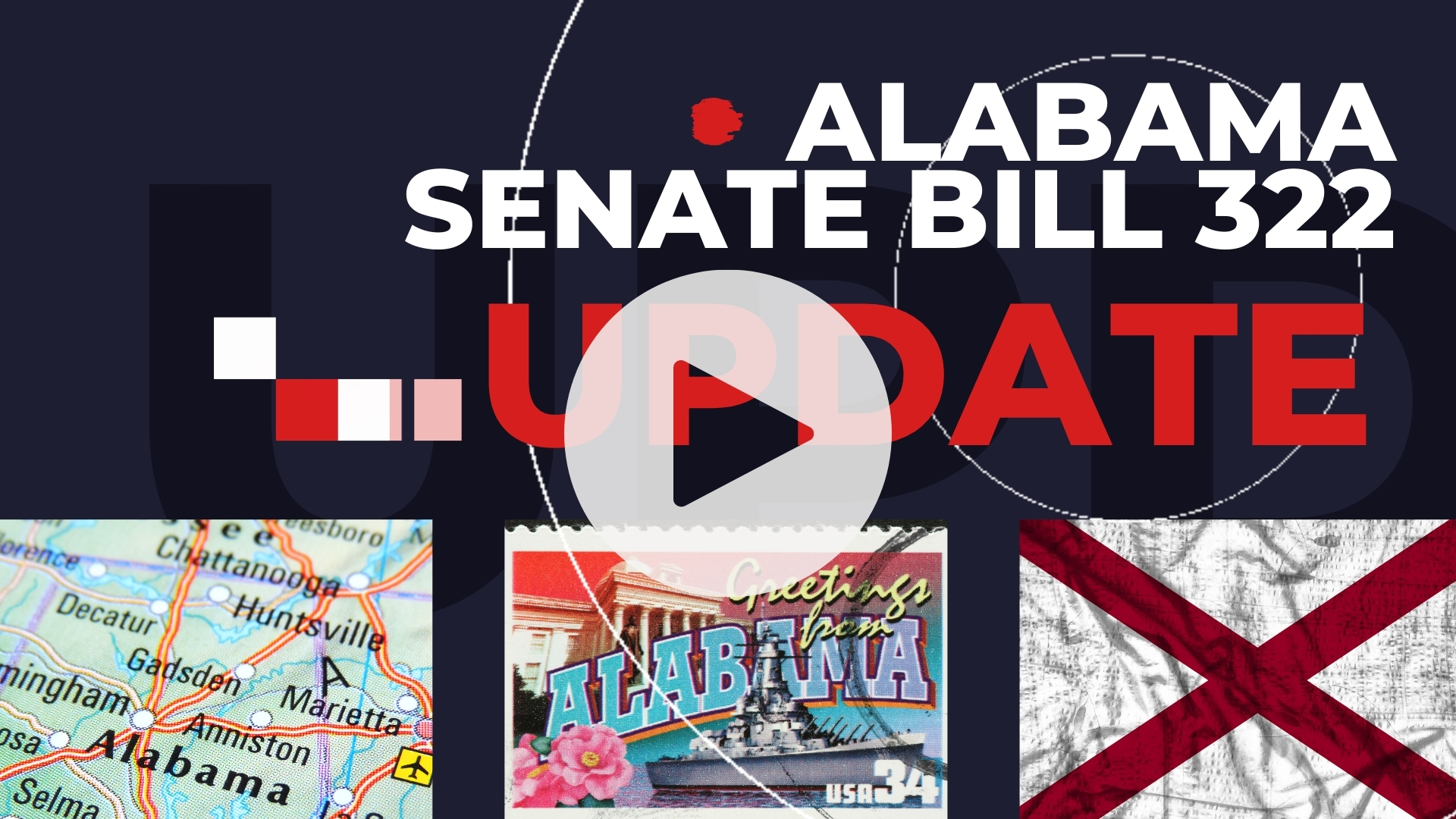Notary Public Underwriters Blog
A Closer Look at Alabama Senate Bill 322
- Details
- Published: August 31, 2023

On September 1, 2023, Alabama's notary public law will change significantly with the implementation of Senate Bill 322 (Alabama Act 2023-548). The new law amends various sections of the Code of Alabama 1975 pertaining to the office of notaries public. In this blog post, we will break down the key points of this new law.
Notary Commission Process (Becoming a Notary or Renewing a Commission)
One of the central changes brought about by Senate Bill 322 (Alabama Act 2023-548) relates to the commissioning process for notaries.
Increased Notary Fees: The probate judges' fee for the issuance of a notary commission was previously set at ten dollars ($10); this fee has now been raised to twenty-five dollars ($25). Applicants will also be required to pay a $10 application fee at the time the notary application is submitted.
___
NOTE: Although these are set fees according to the Code of Alabama 1975, there may be additional fees, determined by your residence county, when filing the application and/or notary bond. Please contact the probate judge in your county to confirm the fees.
Increased Notary Bond Requirement: The new law increases the bond required of a notary public from twenty-five thousand dollars ($25,000) to fifty thousand dollars ($50,000). The law clarifies that a notary public is not an insurer, but is under a duty to act honestly, skillfully, and with reasonable diligence. Notaries commissioned as of 9/1/2023 are not required to have a $50,000 notary bond until they renew.
 Keep in mind that the bond safeguards the public, not the notary. Should a claim arise against your bond, you are responsible for repayment. We strongly recommend all notaries carry Notary Public Errors & Omissions Insurance (E&O Insurance). This insurance is designed to provide protection if you find yourself facing legal action due to errors, omissions, or mistakes in your role as a notary. In simple terms, E&O insurance acts as your safety net, ensuring that your personal assets and financial stability remain intact, even if you encounter legal challenges related to your notarial duties. It is a wise investment that provides peace of mind and security, allowing you to focus on your responsibilities as a notary without the constant worry of potential legal liabilities.
Keep in mind that the bond safeguards the public, not the notary. Should a claim arise against your bond, you are responsible for repayment. We strongly recommend all notaries carry Notary Public Errors & Omissions Insurance (E&O Insurance). This insurance is designed to provide protection if you find yourself facing legal action due to errors, omissions, or mistakes in your role as a notary. In simple terms, E&O insurance acts as your safety net, ensuring that your personal assets and financial stability remain intact, even if you encounter legal challenges related to your notarial duties. It is a wise investment that provides peace of mind and security, allowing you to focus on your responsibilities as a notary without the constant worry of potential legal liabilities.
New Notary Application: When seeking to become a notary public or renew a commission in the past, each county had its own version of the notary application and process; however, Senate Bill 322 (Alabama Act 2023-548) has now established a standard application to be used across the state. This is a welcome change that we hope will help create a uniform process in Alabama. Under the new law, all applicants applying to become a notary or renewing their commission must complete an application developed by the Alabama Probate Judges Association and the Alabama Law Institute.
Application Grounds for Denial: The new law establishes that judges of probate have the authority to accept or deny any application for a notary commission. Furthermore, judges of probate are now required to deny a notary public commission application on the following grounds:
- The applicant is not a resident of Alabama.
- The applicant submits the application to the incorrect probate judge.
- All applicants are required to submit their application to the judge of probate in their county of residence.
- The applicant has been convicted of a felony or crime of moral turpitude.
- The applicant is currently a debtor in a bankruptcy proceeding.
- The applicant is under a current order adjudicating him or her to be incapacitated.
- The applicant provides false information on the application.
- The applicant is unable or unwilling to successfully complete the required training program within 30 days after submitting his or her application.
- This time frame may be extended by the judge of probate upon good cause shown.
Training Requirement: Notary public applicants must complete a training program prepared by the Alabama Probate Judges Association and the Alabama Law Institute that reinforces and updates applicants' knowledge of all matters relevant to the appointment, authority, duties, and legal and ethical responsibilities of a notary public. Failure to do so will result in a denial of commission. Attorneys who become Alabama notaries are exempt from this training.
_____
NOTE: If you are an existing notary, you will be required to complete this training upon the renewal of your commission.
Performing Notarial Acts
Alabama's new law also specifies how notarial acts are performed and recorded:
Notarial Certificate Requirements: Notarized instruments to be recorded in public records, including the court system, must include an oath, acknowledgment, and signature of each party to the document, or his or her mark, and the signature of the notary public and their seal of office by either an ink stamp or embossed impression.
It is important to understand that this affects all notaries. Some of the most common documents you may come across such as deeds, leases, bills of sale, agreements, powers of attorney, and notary bonds may not reflect the proper notarial certificate under the new law. It is your responsibility to ensure your completed notarial certificate for any document that could be recorded in public records, including the court system, indicates both the oath and acknowledgment notarial acts.
Physical Presence Requirement: Except for remote notarization under Alabama Code §36-20-73.1, any signature acknowledged by a notary must be executed within Alabama and in the physical presence of the notary at the time of the acknowledgment, only after the notary public has positively identified the prospective signer by personal knowledge or the examination of photo identification issued by a governmental entity or agency.
Prohibited Act: A notary is prohibited from performing an acknowledgment in any transaction where he or she has a pecuniary interest.
It is a widely accepted best practice that a notary should refrain from notarizing a document in which they have a financial interest. A notary must always be neutral and impartial. If they are connected to the transaction or stand to gain from it, their impartiality is compromised. Furthermore, a notary should steer clear of transactions that could potentially raise doubts about their impartiality.
Notary Fees
Senate Bill 322 (Alabama Act 2023-548) implemented changes to the notarial fee structure.
Notarial Act Fee Increase: The fee that notaries can charge for each notarial act increases from $5 to $10, effective September 1, 2023.
No Fees for Government Employees: Alabama state, county, and municipal employees are prohibited from charging fees for notarial acts performed as part of their public service, unless otherwise provided by law.
Unlawful Acts and Penalties
The new law specifies prohibited acts and consequences for violation of notary laws.
Warning, Restriction, Suspension, or Revocation: The commissioning probate judge or their successor in office may issue a warning to a notary, or restrict, suspend, or revoke a notary's commission for a violation of Alabama's notary law; and/or on any ground for which an application for a commission may be denied. A period of restriction, suspension, or revocation does not extend the expiration date of a commission.
Criminal Penalties: The new law introduces criminal penalties for committing certain prohibited acts.
- Class C Misdemeanors: Except as otherwise permitted by law, an individual who commits any of the following acts is guilty of a Class C misdemeanor:
- Holding one's self out to the public as a notary without being commissioned.
- Performing a notarial act with an expired, suspended, or restricted commission.
- Performing a notarial act before taking an oath of office.
- Charging a fee for a notarial act in excess of the maximum fee allowed by this article.
- Taking an acknowledgment or administering an oath or affirmation without the principal appearing in person before the notary or following the procedures for remote notarization set out in this article.
- Taking an acknowledgment or administering an oath or affirmation without personal knowledge or satisfactory evidence of the identity of the principal.
- Taking a verification or proof without personal knowledge or satisfactory evidence of the identity of the subscribing witness.
- Class D Felonies: A notary is guilty of a Class D felony if he or she does any of the following with the intent to commit fraud or to intentionally assist in the commission of a fraudulent act:
- Takes an acknowledgment, or a verification or proof, or administers an oath or affirmation he or she knows or reasonably believes to be false.
- Takes an acknowledgment or administers an oath or affirmation without the principal appearing in person before the notary, or without following the procedures for remote notarization set out in this article.
- Takes a verification or proof without the subscribing witness appearing in person before the notary, or without following the procedures for remote notarization set out in this article.
- Performs notarial acts in this state with the knowledge that he or she is not properly commissioned under Chapter 20 of Title 36 of the Code of Alabama.
- Injunctive Relief: The commissioning judge of probate has the authority to order injunctive relief against any individual who violates the notary law, including, but not limited to, ordering the surrender and destruction of a notary commission and seal.
Liability for Influencing Notary Misconduct: Any individual who knowingly solicits, coerces, or in any material way influences a notary to commit official misconduct is guilty as an aider and abettor and is subject to the same level of punishment as the notary.
Reporting Violations and Investigations: Any party to a transaction requiring a notarial certificate for verification, and any attorney licensed in Alabama who is involved in such a transaction in any capacity, may execute an affidavit setting forth the alleged violations. These affidavits are filed with either the Secretary of State or the judge of probate who issued the commission to the notary, who will forward them to the Alabama State Law Enforcement Agency upon receipt. The Alabama State Law Enforcement Agency shall initiate and carry out, on their own or in coordination with local law enforcement agencies, investigations of violations and refer the founded investigations to the appropriate district attorney for prosecution.
Notaries Still Subject to Investigation After Resignation or Expiration of Commission: Under the new law, notaries are not immune from investigation simply because they resign or their notary commission has expired. The authorities may still investigate them for any wrongdoing that occurred while they were a notary.
Senate Bill 322 (Alabama Act 2023-548) is an important milestone for Alabama’s notaries. This comprehensive new law, effective September 1, 2023, addresses a multitude of concerns regarding notaries public and aims to establish a higher standard of professionalism, accountability, and ethical conduct within the field. The new law not only emphasizes the responsibilities and obligations of notaries but also highlights the consequences of non-compliance. Understanding and practicing these new laws is not just a legal obligation but a demonstration of commitment to the vital role notaries play within the legal system and many areas of commerce.
Disclaimer: The information provided in this blog is intended for general information purposes and should not be considered as legal advice. The contents of this post are based on the provisions of Senate Bill 322 (Alabama Act 2023-548) and knowledge as of the publication date. This blog post will be updated as more information becomes available. We encourage you to review this bill in its entirety as you are required to act in compliance with all applicable notary laws, rules, and regulations.
Related Article(s)
What Do I Do With My Record Book (Journal) Entry When a Notarization Is Cancelled (Not Completed)?
May a Notary Correct Their Error or Omission on a Notarial Certificate?
Notarizing a Signature: Performing the Verbal Ceremony
Notary and Signing Agent Insurance - What Are They and Do I Need Them?
Multiple Document Signers – Not All Are Present

